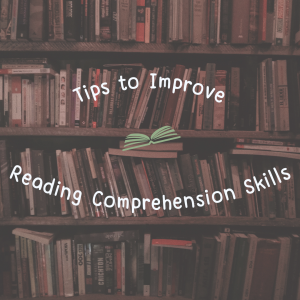Tips to Improve Reading Comprehension Skills

Difficult subjects and lots of technical terms are what students usually see when consuming information from classes’ reading materials. Hence, it is important to spend more time investing in improving your reading skills. Practice makes perfect. Once the practice of predicting, skimming, scanning, and in-depth reading becomes a habit, less time will be spent on consuming the materials and your reading comprehension skills will naturally increase.
Below are a few tips you can apply to make learning information more manageable:
- Identify and summarize key ideas
The process of identifying the main points of an article is essential. This includes techniques, such as predicting, skimming, scanning, and in-depth reading. Prediction in reading requires readers to make related assumptions based on viewing the title of an article. Skimming is reading rapidly to receive a general understanding of the material, usually will be the first line of each paragraph. Scanning is reading rapidly to find specific facts. In-depth reading is reading to get the in-depth information of the content. Once you identify all the key points, putting them into a summary will be much easier.
A tip for the convenience of later revision is creating a mind map for each weekly topic. A mind map helps you identify the main concepts, explore more in-dept information by adding more branches, and visualize things easier through supported visuals.
- Take notes as you are reading
Taking notes is a step you should take when identifying all the key points. Annotating and highlighting valuable information helps you stay focused and improve reading comprehension more effectively. You can use the 5W1H technique, including what, where, when, why, who, and how, to gain better understanding of the explicit and implicit meaning of the text and develop thinking strategies. This also allows you to raise questions to find more explanation of the new concepts or to define unfamiliar words and recall information more easily. Most articles contain multiple layers of context and meanings, that the authors attempt to convey, both textual and subtextual, therefore, taking notes while reading will help you explore and think more critically than you think.
- Supplement classes with additional readings
Taking initiative to consume more knowledge from additional resources is imperative. Prior and after-class knowledge helps students make their way through tougher courses’ materials and promote reading comprehension. You can find other related conceptual articles and/or recommended academic resources either from our on-campus library, the MyCC Library, and/or online. The more you read, the more vocabulary and knowledge you will gain.
Reading improves everything. Many studies have shown reading can be a powerful driver for improving listening, speaking, and writing skills. Have fun with words! Instead of feeling being forced to consume the content, try to enjoy reading as much as you can. You will be surprised at how much vocabulary and knowledge you will gain and how familiar you can be when you encounter unknown words and how words are used in context.
Keep on reading! Make reading a habit!





